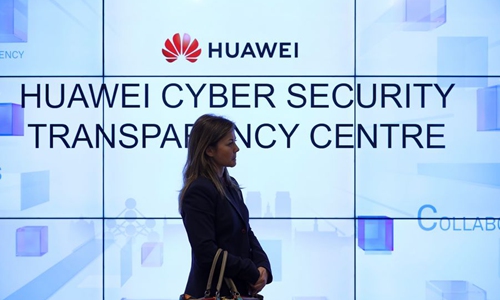Huawei pressing forward in Europe
Technology giant ramps up efforts to replace Google software

A woman listens to a debate at Huawei Cyber Security Transparency Center in Brussels, Belgium, on January 2020.(Xinhua/Zhang Cheng)
Huawei announced a series of new 5G products and strategies through a virtual launch in Barcelona, Spain on Monday, expanding its footprint in Europe despite the novel coronavirus outbreak and mounting uncertainties caused by US government's relentless attack.
Key products announced during the launch included the 5G foldable phone Mate Xs featuring its self-developed 5G Kirin 990 chipset, with a starting price from 2,499 euros ($2,711.88), a flagship 5G tablet MatePad Pro and two Wi-Fi 6+ enabled connectivity solutions.
To blunt the US assault, the company has been building up its proprietary software to replace Google's android system in the face of the US ban. The firm unveiled HUAWEI AppGallery, Huawei's official Huawei Mobile Services (HMS) based app store, during the event, in a bid to support its devices shipments in Europe without Google's software.
"To cultivate a fully-fledged ecosystem that will support Huawei devices moving forward, we are gradually opening up our chip-device-cloud capabilities to global developers through HMS. The HMS ecosystem we envisioned will be a powerful pillar supporting our devices," Yu said at the event.
"The HMS ecosystem, together with its self-developed HarmonyOS, is a critical step for Huawei to boost sales in the European market," Jiang Junmu, chief writer at telecom industry news website c114.com.cn, told the Global Times on Monday, noting that the company has kept its research and development power, despite the crackdown efforts by politicians in Washington.
According to Huawei's operating results for the first three quarters of 2019, the HMS ecosystem was progressing rapidly, covering more than 170 countries and regions worldwide, drawing more than 1.07 million global registered software developers.
The Chinese technology giant also vowed to invest a total of $1 billion and host more than 100 events to attract global software developers to help accelerate its HMS ecosystem.
"But building a new ecosystem to replace Google is not easy - it's tough and takes much time, and it's not clear whether its localization efforts in Europe could finally pay off before the US ban takes effect," Xiang Ligang, a veteran telecom analyst who is also a close follower of Huawei, told the Global Times on Tuesday.
It's also a complicated case of Game Theory between Huawei and Google. Huawei is pressuring the US technology giant by developing its own operating system and ecosystem, while Huawei still needs Google to help it push forward its strategy overseas, Xiang added.
Huawei recently secured a green light for the construction of a 5G rollout in Germany and the UK, which was seen as two major sales victories across the continent amid intensified US pressure. Huawei also launched a 5G program in London last week, a signal of the company's market ambitions in Europe.
Over the past year, the company has experienced an exceptional performance, as it anticipates an annual revenue of 850 billion yuan ($120.86 billion) for 2019, a year-on-year growth of 18 percent, Richard Yu Chengdong, CEO of Huawei Consumer Business Group, said on Monday.
Moreover, despite lagging overseas sales under the threat of a US ban, global shipments achieved growth of 16.8 percent year-on-year for 2019, securing its position as the world's second-largest handset manufacturer with a total of 240 million phone sales. Shipment of its 5G handsets surpassed 10 million as of January 2020, Yu said.
Analysts cautioned that this year would not be easy for Huawei in Europe. The threat of a US supplies ban hindered overseas sales last year and came at a time when the company was on course to surpass Samsung as the world's top smartphone vendor.
"When Huawei launches its next-generation phone series next month, the firm might also release its new 5-nanometer chip Kirin series by then - which might help it avoid a US ban on TSMC chip sales," Xiang predicted.
The challenge before Huawei remains huge, Xiang said, but Huawei will survive the US attack. "Huawei is becoming a multinational companies with many suppliers scattered around the world. So, to ban Huawei means to disrupt a global supply chain, which no single technology company would escape the pain, no matter whether it's Qualcomm, Intel or TSMC."